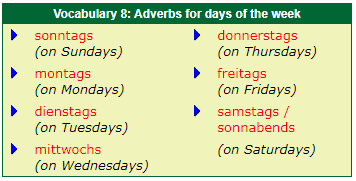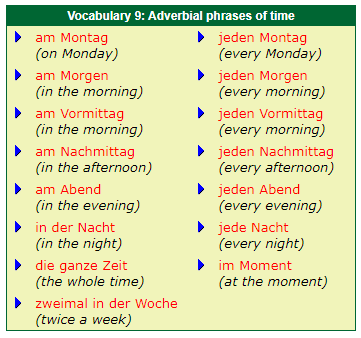
To translate "on Tuesday mornings", "on Wednesday evenings" etc., form a compound noun consisting of the name of the day followed by the adverb for the appropriate part of the day - "morgens", "vormittags", "abends" and "nachts". Such compound adverbs do not start with a capital letter. For example:
Wir treffen uns freitagabends zum Kegeln.
(We meet on Friday evenings and go bowling.)
Ich leihe mir donnerstagnachmittags ein Video aus.
(I rent a video on Thursday afternoons.)
Wir spielen sonnabendvormittags Fußball.
(We play football on Saturday morning.)
Adverbial phrases
We have also encountered a number of adverbial phrases with which you can express the time in German. These are listed below:

Notes
Both "der Morgen" and "der Vormittag" can be used to translate the English word "morning".
Many adverbial time phrases in German are in the accusative case. This is the case for "jeden Tag", "jede Nacht" etc. and also for the phrase "die ganze Zeit".
To translate "on Tuesday morning" or "every Wednesday evening", form a compound noun from the name of the day and the part of the day. As the gender of the compound noun is determined by the gender of the final element, the endings on "am" and "jede(n)" remain unchanged. For example:
Jeden Freitagabend treffen wir uns zum Kegeln.
(Every Friday evening we meet up and go bowling.)
Jeden Donnerstagnachmittag leihe ich mir ein Video aus.
(Every Thursday afternoon I rent a video.)
Am Sonnabendvormittag spielen wir Fußball.
(We play football on Saturday morning.)
 英语
英语 日语
日语 韩语
韩语 法语
法语 西班牙语
西班牙语 意大利语
意大利语 阿拉伯语
阿拉伯语 葡萄牙语
葡萄牙语 越南语
越南语 俄语
俄语 芬兰语
芬兰语 泰语
泰语 丹麦语
丹麦语 对外汉语
对外汉语

